Class 6 History Chapter 4 Notes - What Books and Burials Tell us
Vedas: One of the Oldest Books in the World
One of the oldest books in the world is the Vedas. They were written about 3,000 years back and are the earliest literary source available.
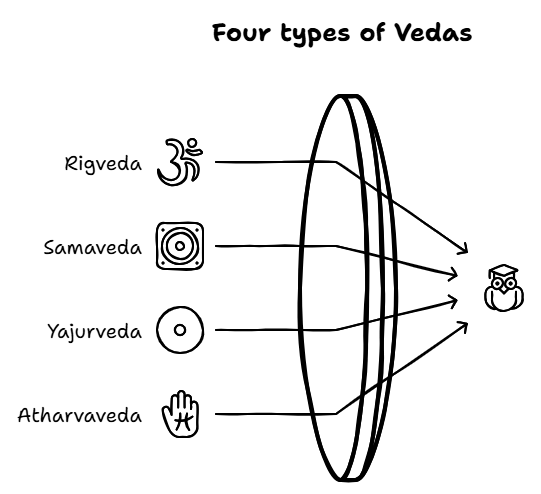
There are four types of Vedas:
- Rigveda
- Samaveda
- Yajurveda
- Atharvaveda.
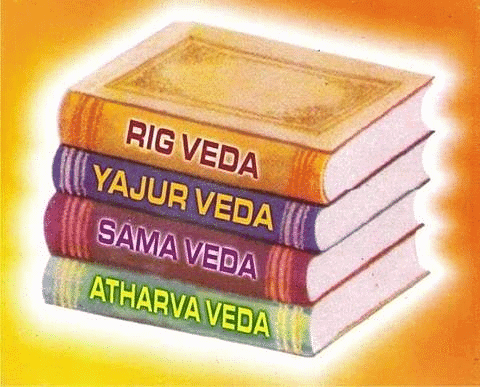 The Four Vedas
The Four Vedas
The Rigveda
It is the oldest Veda and was composed about 3500 years ago. The Rigveda includes more than a thousand hymns, called sukta or “well-said”. These hymns are in praise of various gods and goddesses. Three gods are especially important, which are:
- The Agni, the god of fire
- Indra, a warrior god
- Soma, a plant from which a special drink was prepared
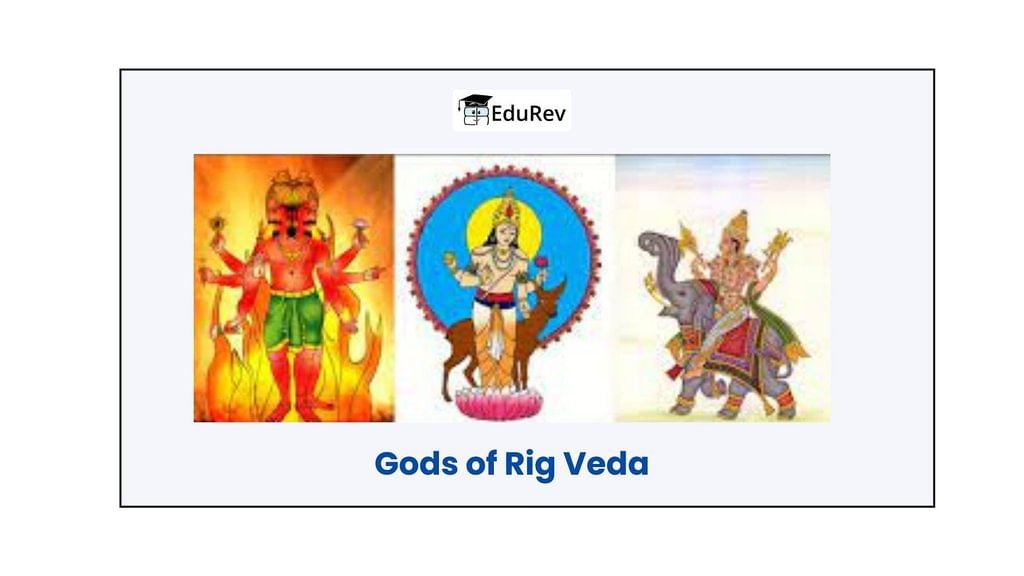
Most of the hymns were composed, taught, and learned by men. A few were composed by women. The Rigveda is in old or Vedic Sanskrit. The Rigveda was recited and heard rather than read. It was written down several centuries after it was first composed and printed less than 200 years ago.
Language of Rigveda: Sanskrit
The language of the Rigveda is in old or in Vedic Sanskrit which is different from the Sanskrit we learn these days.
- There are three families of languages. Sanskrit is part of a family of languages known as Indo-European.
- The Indo-European family includes Sanskrit, Assamese, Gujarati, Hindi, Kashmiri, and Sindhi. Apart from these foreign languages are – Persian, English, French, German, Greek, Italian, and Spanish
How do Historians study the Rigveda
While studying about the past, historians examined the written sources. They studied the Rigveda and found the following things:
- Some hymns of Rigveda are in the form of dialogues between sage and rivers (Vishvamitra and two rivers Beas and Sutlej). River Beas and Sutlej were worshipped as goddesses. Historians study these dialogues to arrive at conclusions.
- A manuscript on the birch bark of the Rigveda was found in Kashmir. About 150 years ago, it was used to prepare one of the earliest printed texts of the Rigveda, as well as an English translation. It is now preserved in a library in Pune, Maharashtra.
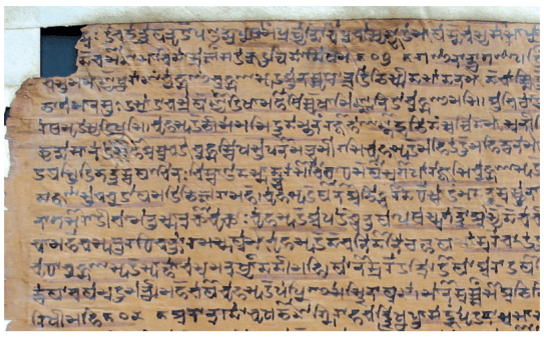 A page from a manuscript of the Rigveda.
A page from a manuscript of the Rigveda.
Cattle, Horses & Chariots
There are many prayers in Rigveda for cattle, children (especially sons), and horses.
- Horses were yoked to chariots that were used in battles. Battles were also fought for land, water, and to capture people.
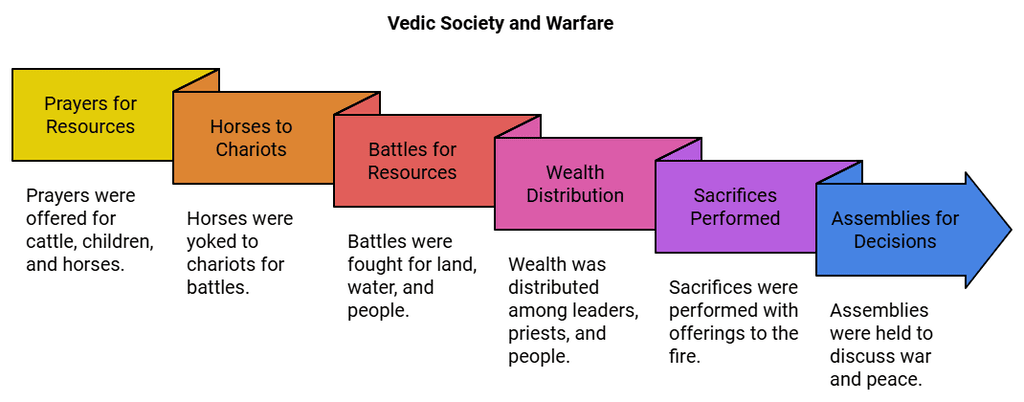
- The obtained wealth was kept by the leaders, some were given to the priests and the rest was distributed amongst the people. Some wealth was used to perform sacrifices (yajnas) in which offerings were made to the fire. Offerings could include ghee, grain, and in some cases animals.
- In the Vedic age, there were no regular armies but there were assemblies where people met and discussed matters of war and peace. They also chose leaders, who were often brave and skillful warriors.
Words to Describe People
The people were described on the basis of the work they did, the language they spoke, the place they belonged to, their family, their communities, and their cultural practices.
- The priests: There are two groups who are classified in terms of their work – ‘the priests’, sometimes called Brahmins, who performed various rituals and ‘the rajas’.
 The Priests
The Priests
- The rajas: Rajas were different from what we think in the present time. They did not have capital cities, palaces, or armies, nor did they collect taxes, sons did not automatically succeed fathers as rajas.
- ‘jana’ and Vish’: General people were called from two names -‘jana’ and Vish’. The word ‘jana’ is still used in Hindi and the word Vaishya’ comes from ‘vish’.
- Aryas and Dasas: The people who composed the hymns described themselves as ‘Aryas’ and called their opponents ‘Dasas’ or ‘Dasyus’. These were people who did not perform sacrifices and probably spoke different languages. Later, Dasas and Dasyus were replaced with Dasa and Dasi meaning slave. Slaves were both men and women and they were often captured in war. They were treated as the property of the owner.
Silent Sentinels - the story of the megaliths
Stone boulders are known as megaliths and were used to mark burial sites. The practice of erecting megaliths began about 3000 ago years and was prevalent throughout the Deccan, south India, in northeast and Kashmir.
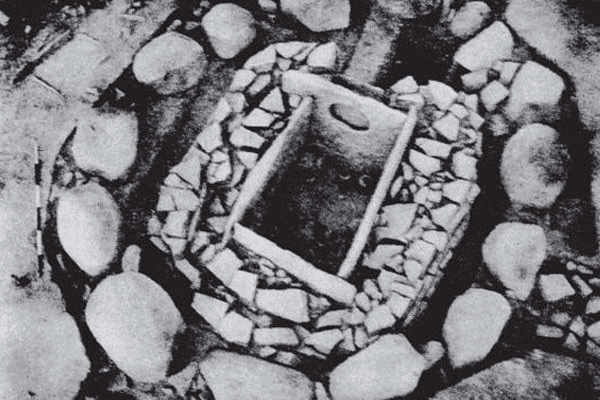 Cists megaliths have portholes that could be used as an entrance.
Cists megaliths have portholes that could be used as an entrance.
- Some megaliths are found on the earth's surface whereas some are underground.
- Sometimes, archaeologists find a circle of stone boulders or a single large stone standing on the ground. These are the only indications that there are burials beneath.
- Generally, the dead were buried with distinctive pots, which were called black and redware. There were also found tools and weapons of iron and sometimes, skeletons of horses, horse equipment, and ornaments of stone and gold.
- Different items were found in different burials. Some burials have more objects such as objects of gold, stone, copper, conch shell whereas some only have pots.
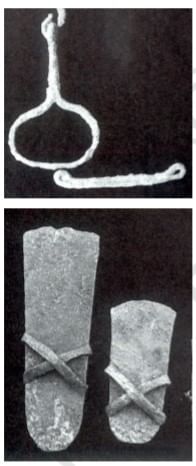 Iron Equipment found from megalithic burials.
Iron Equipment found from megalithic burials.
Finding out about social differences
Archaeologists assume that objects discovered with a skeleton probably belonged to the dead person.
- In Brahmagiri, a skeleton was buried with 33 gold beads, 2 stone beads, and one conch shell whereas other skeletons only had a pot.
- This shows the difference in status, amongst the people who were buried. Some were rich while others were poor.
Were some burial spots meant for certain families?
- Sometimes, megaliths contain more than one skeleton. These indicate that people, perhaps belonging to the same family, were buried in the same place at different times through portholes.
- Stone circles or boulders placed on the surface probably served as signposts to find the burial site, so that people could return to the same place whenever they wanted to.
A special burial at Inamgaon
- Another burial site ‘Inamgaon’ was occupied between 3600-2700 years ago. It is a site on the river Ghod, a tributary of the Bhima.
- Here, the dead were buried in the ground, laid out straight, with the head towards the north. Sometimes, burials were also within the houses. The vessels, containing food and water were placed with the dead.
Occupations at Inamgaon
Found in Inamgaon site:
- Grains: wheat, barley, rice, pulses, millets, peas, and sesame.
- Animals: cattle, buffalo, goat, sheep, dog, horse, ass, pig, sambhar, spotted deer, blackbuck, antelope, hare, and mongoose.
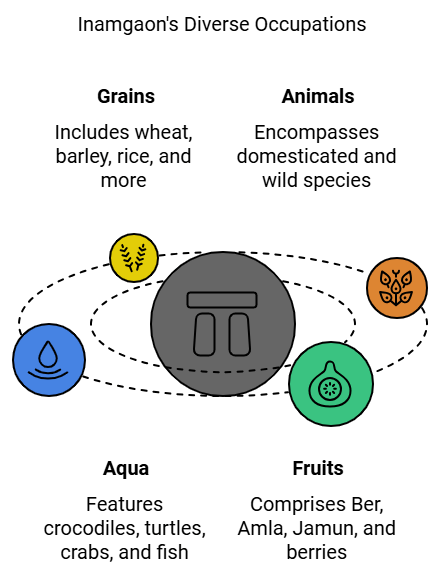
- Aqua: crocodile, turtle, crab, and fish
- Fruits: Ber, Amla, Jamun, dates, and a variety of berries.
- Bones of a number of animals, many bearing cut marks that show they may have been used as food, have also been found.
FAQs
Q.1. In what ways are the books we read today different from the Rigveda?
The books we read today are written and printed. The Rigveda was recited and heard rather than read. For many years from generation to generation, the process continued. It was written down several centuries after it was first composed and printed less than 200 years ago.
Q.2. In what ways do you think that the life of a ‘raja’ was different from that of a ‘dasa’ or ‘dasi’?
In society, ‘raja’ was one of the highest civil positions. ‘Rajas’ were the kings of the community, whereas the ‘dasas’/’dasis’ were the lowest position in society. The ‘dasas’/’dasis’ were slaves who were used for work. They were treated as the property of their owners. They were captured in war.
Q.3. Describe in brief how the Rigveda depicts cattle, horses, chariots, and battles.
Rigveda has prayers for cattle and horses. Horses were used in battles. Battles were fought for cattle, land, people, and water. Most men took part in wars. There was not any regular army. There were assemblies where people met and discussed matters of war and peace. They chose brave warriors as their leaders.
FAQs on Class 6 History Chapter 4 Notes - What Books and Burials Tell us
| 1. What is the Rigveda and why is it significant? |  |
| 2. How do historians study the Rigveda to understand ancient societies? |  |
| 3. What role did cattle, horses, and chariots play in the society described in the Rigveda? |  |
| 4. How do burial practices in ancient times, like those at Inamgaon, indicate social differences? |  |
| 5. What can we learn about occupations from the findings at Inamgaon? |  |






















